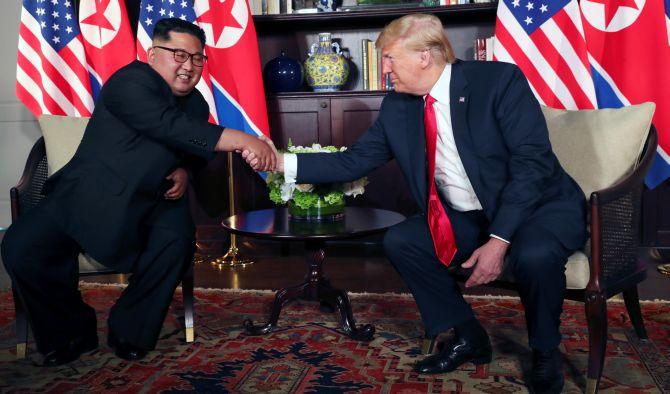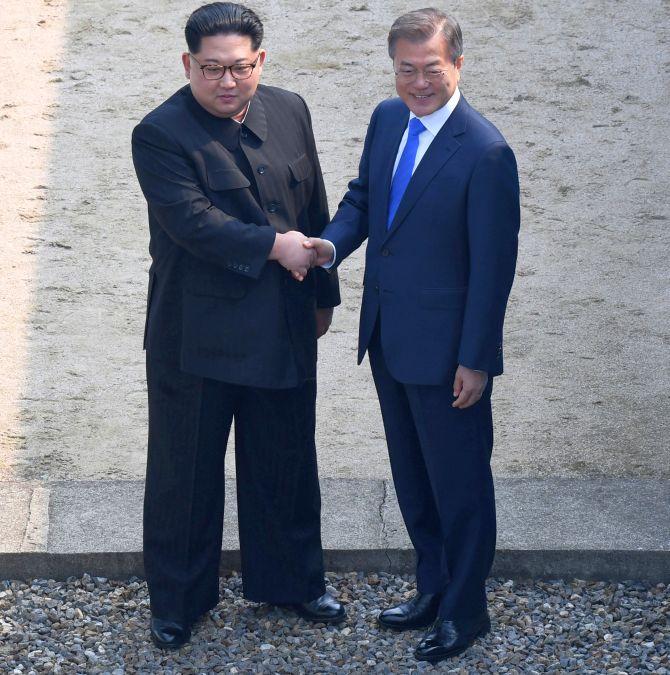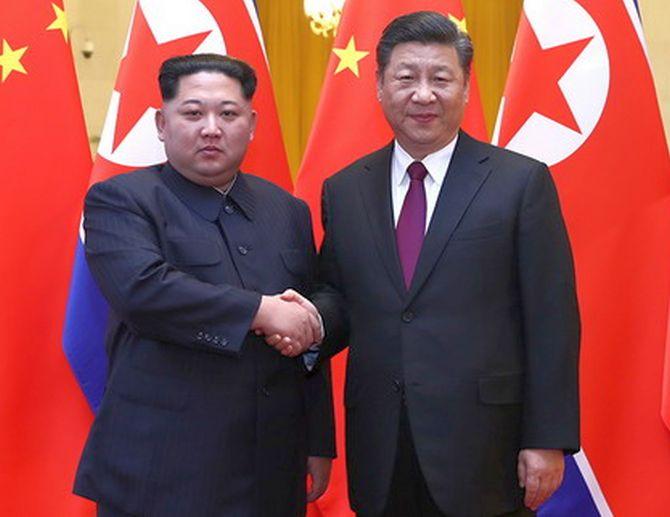'Xi Jinping is keen that the second Trump-Kim summit happens soonest.'
'Kim is reported to have told Xi that he expects to achieve a result from a second summit that the international community would welcome,' points out Dr Rajaram Panda.

North Korean leader Kim Jong Un hit international headlines in 2018 by emerging from his reclusive posture and indulged in a high-powered diplomacy.
In the closing months of last year, there looked a setback as no further progress was announced on the issue of negotiating North Korea's nuclear issue despite much promise during Kim's summit meeting with US President Donald Trump in June in Singapore.
Kim never stepped out of his isolated and sanction-hit country for six years after inheriting power in 2011.
Neither did he meet any foreign heads of State and concentrated to strengthen his hold on power by purges, executions and other ruthless means to send the message that he was in full control of the nation.
At the same time, his focus never deviated from his mission of overseeing rapid technological advancement in the country's nuclear arsenal.
To send a loud message to the outside world, he launched a series of ballistic missiles and even conducted nuclear tests before he aspired to sit across the high table with United States President Donald J Trump as an equal to talk on the issue of denuclearisation of the Korean Peninsula.
Having achieved that objective with the Singapore summit, the issue of real denuclearisation remained suspended with plenty of ambiguities on the interpretations of the terms of the agreement reached in Singapore.
While his real intentions and sincerity to denuclearise remains subjected to interpretations, the talks for a second summit with Trump that did the round last year is again being talked about following his eighth summit in just 10 months with Chinese President Xi Jinping in the early days of January 2019.
What do these diplomatic dalliances by Kim mean to the world keen to see a resolution to the nuclear issue of North Korea?
To connect to the present development in order to project the possible developments to unfold in the coming months of 2019, here is in brief a ready recapitulation to what transpired in 2018.
Following his New Year speech last year wherein Kim expressed his desire to engage in dialogue with the stakeholders, he sent North Korean athletes and officials to take part in the Pyeongyang Winter Olympics hosted by South Korea in February and sent his sister to shake hands with South Korean President Moon Jae-in.
This was soon followed by his first ever unannounced visit to Beijing on March 26, 2018 on board his private train to meet Chinese President Xi Jinping.
It may be remembered that China has remained as the main diplomatic backer and main business partner of North Korea since the end of the Korean War in 1953.
Days later, the date for the first summit between Kim and Moon was announced, which finally happened in a blaze of publicity on April 27 at Panmunjom, the truce village in the Demilitarised Zone.
The leaders of the two sides shook hands when Kim for the first time crossed to the South Korean side of the DMZ.
Both agreed to pursue a permanent peace treaty and complete denuclearisation of their divided peninsula.
Then six weeks after his meeting with Xi, Kim flew to the Chinese port city of Dalian to prepare for the first-ever summit with Trump in Singapore.
Both leaders met on May 7-8 and Xi then took up the issue with Trump.
When Trump suddenly announced the cancellation of the planned summit with Kim, Kim and Moon met again in Panmunjom on May 26 with the objective to salvage the process of having a summit with Trump.
Trump seemed convinced when Moon announced Kims sincerity and then agreed to meet Kim.
Soon, Trump and Kim had their landmark summit on June 12 in Singapore, thereby burying preceding months of insults and threats of war.
What one saw thereafter was a vaguely worded pledge of denuclearisation by Kim and Trump agreeing to suspend 'very provocative' annual US joint military exercises with South Korea.
Within a week after the Singapore summit, Kim again went to Beijing on June 19-20 to report on what transpired at Singapore.

Back to inter-Korean diplomacy, Moon travelled to Pyongyang on September 18-20 for his third summit with Kim despite a deadlock in talks between Pyongyang and Washington.
He took along with him an entourage of top business moguls to convey the message to Kim that Seoul is keen on business with North Korea.
Kim offered to shutter a missile-testing site and a key nuclear facility at Yongbyon if the US takes unspecified 'corresponding measures'.
In a spirit of bonhomie, both leaders went to Mount Paektu, the spiritual birthplace of the Korean nation.
Despite expectations, Kim's visit to Seoul in 2018 did not happen.
Diplomacy and negotiations resumed with the herald of New Year 2019 when Kim and his wife Ri Sol Ju traveled to Beijing on board his private train for his eighth summit in just 10 months with Xi.
This fourth Kim-Xi meeting was preceded by three summits with Moon and the high-profile summit with Trump in Singapore.
As the hiatus between Trump and Kim continued to remain with the latter warning of choosing an alternative path if the former does not ease sanctions and pressure on North Korea, it was probably Xi who intervened to explore a breakthrough and invited Kim to Beijing to talk over.
This has again revived talks for a second summit between Kim and Trump which was expected to happen last year, but did not, to take the agreement reached in Singapore forward.

Denuclearising the Korean peninsula is a tricky issue that needs tactful diplomacy.
Pyongyang continues to put stiff conditions and Trump seems unwilling to bend and therefore the issue is stuck with no solution in sight.
A shrewd Kim reminds the Trump administration that 'he does have diplomatic and economic options besides what Washington and Seoul can offer', observes Harry J Kazianis, director of defence studies at the US-based Centre for the National Interest.
With Kim getting cozy with Beijing, Trump's discomfort only will increase.
That Kim was accompanied by, besides Ri Sol Ju, with senior officials, including vice chairmen of the Central Committee of the Workers Party of Korea Kim Yong Chol (who is likely to meet US Secretary of State Mike Pompeo in Washington, DC on Friday, January 18, and pay a courtesy call on President Trump later) and Pak Thae Song, the former being a key negotiator in talks with the US, Foreign Minister Ri Yong Ho, head of the ministry of the people's armed forces No Kwang Chol, and chairman of the foreign affairs committee of the DPRK supreme peoples assembly Ri Su Yong, meant that both Kim and Xi would strategise how to deal with Trump and get a result that would be in favour of North Korea if the second summit between Kim and Trump does take place anytime soon.
Interestingly, Kim's visit coincided with his 35th birthday, January 8.
Despite the suspicion that Kim and Xi see common ground for an outcome in Pyongyang's favour in the second summit with Trump, if that happens, the US seems unperturbed, with US Secretary of State Mike Pompeo praising China for its support for resolving the North Korean crisis and discounting the fear that the US trade dispute with China would affect this.
The US believes its trade issue and North Korea's nuclear issue are separate and that Beijing would not mix the two.
Opinions could differ if this is the case.
South Korea was euphoric on Kim's Beijing visit and summit with Xi, hoping that this high-level exchange will 'contribute to the complete denuclearisation and establishment of permanent peace on the Korean Peninsula'.
Though Kim had three summit meetings with Moon and one with Trump in 2018, the North Korean leader's first overseas visit since coming to power was to China in March last year.
The Chinese president also accepted an invitation to visit the North, but no such visit has materialised so far.
Kim's visit to Beijing and summit with Xi adds credence to the talks that a second Trump-Kim summit could happen soon.
Even news reports have appeared identifying several possible locations.
What appears to have transpired from Kim's Beijing visit is that a closely coordinated China-North Korea relationship has been worked out ahead of the summit.
Viewed differently, while Xi will want to maintain the perception and reality of China's clout, Kim would wish to signal that he has diplomatic options and leverage when he deals with Trump.
It remains to be seen if Kim's visit to Beijing is a precursor to what the world eagerly expects a second Trump-Kim summit.

From all available reports, it transpires that Xi is keen that the second Trump-Kim summit happens soonest.
The Chinese president is seized of the deep differences that exist between Pyongyang and Washington despite the broad agreement reached in Singapore, which was short on specifics and further negotiations have lacked promise for a resolution.
While Pyongyang has demanded that Washington lifts sanctions imposed following the former's nuclear tests and declare an official end to the 1950-1953 Korean War, Washington insists that Pyongyang must denuclearise first before sanctions are lifted or eased.
As a show of sincerity, Pyongyang took unilateral steps towards denuclearisation by dismantling its only known nuclear testing site and a key missile engine facility.
Xi tried to impress upon Kim that the international community expects tangible results.
'The political settlement of the peninsula issue faces a rare historic opportunity,' Xi told Kim.
Kim is reported to have told Xi that he expects to achieve a result from a second summit that the international community would welcome.
The South Korean president too is upbeat that a second Trump-Kim summit shall happen soon, which shall pave the way for Kim's planned visit to Seoul that could not materialise last year.
The international community expects that Kim takes 'bold steps' towards denuclearisation in order to draw US concessions such as sanctions relief.
If the suspicion that Pyongyang is becoming impatient and beginning to lose hope with the US asking it to make changes without in turn removing sanctions is credible, then any hope towards denuclearisation could end up as a non-starter, for Washington is not expected to change its position.
Since there is an acute trust deficit between Washington and Pyongyang, it seems to be foolhardy to expect Pyongyang to denuclearise and gets security guarantee at the same time.
If this is the scenario, Beijing's role to act a bridge becomes crucial.
From available reports, it emerges that Xi had sympathetic ears to Kim's 'reasonable concerns' and agreed to work for achieving denuclearisation during a second summit which the international community would welcome.
There is no substitute to continuing dialogue if the ultimate goal of realizing resolution of nuclear issues in the Korean Peninsula is to be achieved.
In further expression of its sincerity, Pyongyang could possibly consider to abolish international and intermediate-range ballistic missiles and dismantle weapons production facilities and other nuclear sites.
While such a step could please Washington, it could unlikely to lead towards reduction of US military commitments, such as a withdrawal of troops or strategic assets from the region.
This is because, as Moon remarked 'US forces in South Korea or strategic assets in places like Guam and Japan are not linked with North Korea alone, as they exist for the stability and peace of the entire Northeast Asia.'
Given such complexity, can one expect the second summit to take place anytime soon?
Even if it takes place being brokered by Beijing, can one expect any tangible outcome?
Trump's acknowledgment of receiving a 'great letter' from Kim without revealing its contents does not promise much even while rumours about the location of the summit doing the round.
Interestingly, Trump does not comment on the reported contents in Kim's letter wherein he warned that Pyongyang may change its approach to nuclear talks if Washington persists with sanctions.
From his side, Trump has repeated time and again that sanctions shall remain 'in full force and effect' and would remain in place until the US saw 'very positive' results.
That takes the issue back to the start and all efforts going for a toss.
This means that there is no clarity yet on the agreement reached in Singapore in June 2018 where both Trump and Kim agreed to work towards the denuclearisation of the Korean Peninsula as there was a deficit on what that agreement meant.
Dr Rajaram Panda, former Senior Fellow at the IDSA and until recently ICCR Chair Professor at Reitaku University, Japan, is at present a Lok Sabha Research Fellow.











 © 2025
© 2025